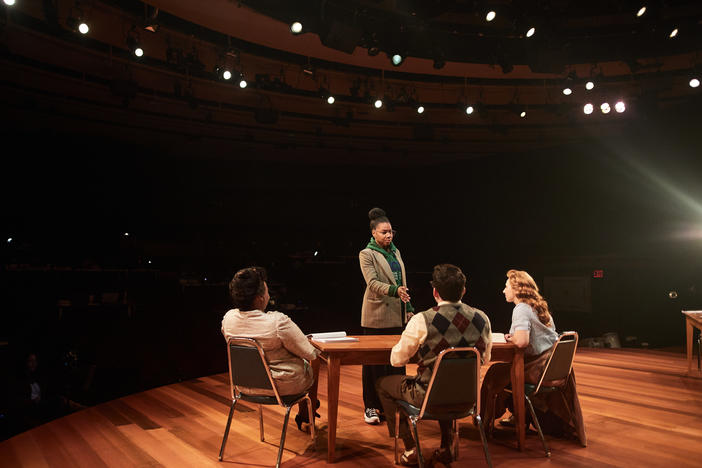Section Branding
Header Content
Performance Venues Wait For Aid From Earlier COVID-19 Relief Measure
Primary Content
A bailout for live music and other event venues passed in the last relief bill. But one month after applications were scheduled to launch, they have not, and many venues are barely hanging on.
Transcript
RACHEL MARTIN, HOST:
Music venues, museums, playhouses, performance spaces of all kinds - many have been closed for the better part of a year. They were supposed to get some money from the last relief package passed in December, but many businesses haven't gotten that aid. And venue workers are getting desperate. NPR's Ryan Kailath reports.
RYAN KAILATH, BYLINE: Daniel Nardicio runs two comedy and burlesque clubs on the Lower East Side of Manhattan. He's lost millions from shutting down. So when he heard about this new grant, 15 billion or more for closed venues like his, he enrolled himself in the night school of federal bureaucracy.
DANIEL NARDICIO: I basically have a Ph.D. now in this grant. I've literally printed out all of the paperwork and set it all up and was all ready to go. And then I've just been sitting there waiting.
KAILATH: Applications for the Shuttered Venue Operators Grant, as it's known, were meant to open up on February 10. A month later, they have not. Nardicio has his paperwork ready to go at a moment's notice.
Where is it right now?
NARDICIO: It's in my book bag. I carry it with me everywhere I go. I can show it to you. Want me to show it to you?
KAILATH: Sure.
NARDICIO: All right. Hold on a second. Beau-Beau (ph), sorry.
KAILATH: His little hunting dog, Beau, slides off his lap.
That's hilarious. It's literally in your bag at all times.
NARDICIO: Because you've got to be ready to drop of hat in America. We treat everything like a freakin' lottery. Getting money to keep your business afloat is a lottery. Getting a vaccine is like - you've got to go online all day long and see if you won the scratch-offs.
KAILATH: This country has a lot of great live arts corridors - Bourbon Street, Beale Street, Sixth Street in Austin - but downtown Manhattan gives them a run for their money. Walk five minutes in any direction in this neighborhood, and you'll pass a club or a theater that stands to gain from this grant.
AUDREY SCHAEFER: If we don't get emergency funding, we're all going down.
KAILATH: Audrey Schaefer represents a group of 3,000-plus music venues. They banded together to hire a lobbying firm and push Congress for the money. She says the vote was unusually bipartisan because...
SCHAEFER: Elected officials realized, hey, this is important in my town, too.
KAILATH: The newest stimulus bill, still moving through Congress, will likely add some money to the $15 billion pot. But the list of eligible businesses is growing, too. Music venues secured it, but it's now expanded to include museums, movie theaters, playhouses. Travel agencies are pushing to be included.
SCHAEFER: Well, there's a concern that there might not be enough now.
KAILATH: Her group of music venues understands that other industries have been hit as well. The only way to find out if there's enough money for everyone is for the application to open. The Small Business Administration, which is running the grant, declined to speak with NPR. It's a first-of-its-kind program, so the SBA is sort of building the plane while it flies. It said in a statement, new staff is coming on to hand-review applications while the Web portal is built out.
NARDICIO: This can't be easy, so I kind of really feel for people. And I think that this is going to be bumpy. The government's never really shown a acuity towards building websites that work.
KAILATH: Every day the program stays closed is another blow to live venues. Hundreds have already gone under. As Audrey Schaefer says...
SCHAEFER: The promise of the money is one thing, but that is not what stops eviction notices. It's getting the money.
KAILATH: Which, for the country's live venues, remains an act that's coming soon.
Ryan Kailath, NPR News, Manhattan.
(SOUNDBITE OF SONIC YOUTH SONG, "DISCONNECTION NOTICE") Transcript provided by NPR, Copyright NPR.
Bottom Content



